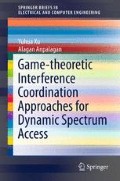Abstract
Due to hardware limitation, the users in dynamic spectrum access networks can sense only a small part of channels (always one) at a time (Zhao, JAMA 25(3):589–600, [1]). As a result, there are two basic channel sensing strategies (Xu, Decision-theoretic distributed channel selection for opportunistic spectrum access: Strategies, challenges, and solutions, [2]): parallel sensing, i.e., a fixed set of channels is simultaneously sensed in each slot, and sequential sensing, i.e., channels are sequentially sensed according to a pre-defined order. For parallel sensing strategies, the users have to keep silent in the current slot if no idle channel is found, which may be inefficient. In comparison, the sequential sensing is more efficient and adaptive. However, interference/collision occurs if more than two users sense and access an idle channel simultaneously. Thus, the sensing orders in the sequential sensing strategy should be carefully designed.
Access this chapter
Tax calculation will be finalised at checkout
Purchases are for personal use only
References
Q. Zhao, L. Tong, A. Swami et al., Decentralized cognitive MAC for opportunistic spectrum access in ad hoc networks: a POMDP framework. IEEE J. Sel. Areas Commun. 25(3), 589–600 (2007)
Y. Xu, A. Anpalagan, Q. Wu et al., Decision-theoretic distributed channel selection for opportunistic spectrum access: strategies, challenges and solutions. IEEE Commun. Surv. Tutor. Fourth Quarter 15(4), 1689–1713 (2013)
Z. Khan, J. Lehtomäki, L. DaSilva et al., Autonomous sensing order selection strategies exploiting channel access information. IEEE Trans. Mob. Comput. 12(2), 274–288 (2013)
J. Zhao, X. Wang, Channel sensing order in multi-user cognitive radio networks, Proceedings of IEEE International Symposium on Dynamic Spectrum Access Networks. (IEEE Publications, Bellevue, 2012)
A. Mendes, C. Augusto, M. Silva et al., Channel sensing order for cognitive radio networks using reinforcement learning. 36th Annual IEEE Conference on Local Computer Networks. pp. 546–553 (2011)
H. Shokri-Ghadikolaei, F. Sheikholeslami, M. Nasiri-Kenari, Distributed multiuser sequential channel sensing schemes in multichannel cognitive radio networks. IEEE Trans. Wirel. Commun. 12(5), 2055–2067 (2013)
S. Kim, G. Giannakis, Sequential and cooperative sensing for multi-channel cognitive radios. IEEE Trans. Signal Process. 58(8), 4239–4253 (2010)
H. Jiang, L. Lai, R. Fan, H. Poor, Optimal selection of channel sensing order in cognitive radio. IEEE Trans. Wirel. Commun. 8(1), 297–307 (2009)
N. Chang, M. Liu, Optimal channel probing and transmission scheduling for opportunistic spectrum access. IEEE/ACM Trans. Netw. 17(6), 1805–1818 (2009)
Y. Xu, J. Wang, Q. Wu et al., Optimal energy-efficient channel exploration for opportunistic spectrum usage. IEEE Wirel. Commun. Lett. 1(2), 77–80 (2012)
H. Cheng, W. Zhuang, Simple channel sensing order in cognitive radio networks. IEEE J. Sel. Areas Commun. 29(4), 676–688 (2011)
T. Shu, H. Li, QoS-compliant sequential channel sensing for cognitive radios. IEEE J. Sel. Areas Commun. 32(11), 2013–2025 (2014). (to appear)
Y. Pei, Y.-C. Liang, K. Teh et al., Energy-efficient design of sequential channel sensing in cognitive radio networks: optimal sensing strategy, power allocation, and sensing order. IEEE J. Sel. Areas Commun. 29(4), 1648–1659 (2011)
H. Tembine, Distributed Strategic Learning for Wireless Engineers (CRC Press, Boca Raton, 2012)
Y. Xu, Q. Wu, L. Shen, J. Wang, A. Anpalgan, Robust multiuser sequential channel sensing and access in dynamic cognitive radio networks: potential games and stochastic learning. IEEE Trans. Veh. Technol. 64(8), 3594–3607 (2015)
D. Monderer, L.S. Shapley, Potential games. Games Econ. Behav. 14, 124–143 (1996)
Y. Xu, J. Wang, Q. Wu et al., Opportunistic spectrum access in cognitive radio networks: global optimization using local interaction games. IEEE J. Sel. Signal Process 6(2), 180–194 (2012)
Y. Xu, Q. Wu, J. Wang et al., Opportunistic spectrum access using partially overlapping channels: graphical game and uncoupled learning. IEEE Trans. Commun. 61(9), 3906–3918 (2013)
Y. Xu, Q. Wu, L. Shen et al., Opportunistic spectrum access with spatial reuse: graphical game and uncoupled learning solutions. IEEE Trans. Wirel. Commun. 12(10), 4814–4826 (2013)
N. Nie, C. Comaniciu, Adaptive channel allocation spectrum etiquette for cognitive radio networks. Mobile Netw. Appl. 11(6), 779–797 (2006)
M. Maskery, V. Krishnamurthy, Q. Zhao, Decentralized dynamic spectrum access for cognitive radios: cooperative design of a non-cooperative game. IEEE Trans. Commun. 57(2), 459–469 (2009)
P. Sastry, V. Phansalkar, M. Thathachar, Decentralized learning of nash equilibria in multi-person stochastic games with incomplete information. IEEE Trans. Syst., Man, Cybern. B 24(5), 769–777 (1994)
Y.-C. Liang, Y. Zeng, E. Peh et al., Sensing-throughput tradeoff for cognitive radio networks. IEEE Trans. Wirel. Commun. 7(4), 1326–1337 (2008)
J. Zheng, Y. Cai, Y. Xu, A. Anpalagan, Distributed channel selection for interference mitigation in dynamic environment: a game-theoretic stochastic learning solution. IEEE Trans. Veh. Technol. 63(9), 4757–4762 (2014)
J. Zheng, Y. Cai, N. Lu, Y. Xu, X. Sherman Shen, Stochastic game-theoretic spectrum access in distributed and dynamic environment. IEEE Trans. Veh. Technol. doi:10.1109/TVT.2014.2366559
J. Zheng, Y. Cai, W. Yang, Y. Xu, A. Anpalgan, A game-theoretic approach to exploit partially overlapping channels in dynamic and distributed networks. IEEE Commun. Lett. 18(12), 2201–2204 (2014)
Author information
Authors and Affiliations
Corresponding author
Rights and permissions
Copyright information
© 2016 The Author(s)
About this chapter
Cite this chapter
Xu, Y., Anpalagan, A. (2016). Robust Interference Coordination with Dynamic Active User Set. In: Game-theoretic Interference Coordination Approaches for Dynamic Spectrum Access. SpringerBriefs in Electrical and Computer Engineering. Springer, Singapore. https://doi.org/10.1007/978-981-10-0024-9_5
Download citation
DOI: https://doi.org/10.1007/978-981-10-0024-9_5
Published:
Publisher Name: Springer, Singapore
Print ISBN: 978-981-10-0022-5
Online ISBN: 978-981-10-0024-9
eBook Packages: EngineeringEngineering (R0)

